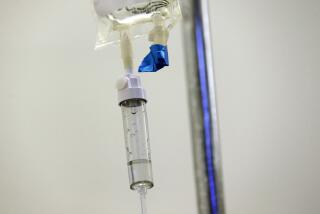Events Shake Doctor’s Faith in Drug Safety
- Share via
WASHINGTON — Dr. Lisa McCoy embraced the arrival of Rezulin in mid-1997 as a “new hope” for her patients who struggled with adult-onset diabetes.
She enthusiastically prescribed the drug for about a dozen diabetics in her Ashland, Ky., family practice but not before warning them about potential side effects, such as nausea, dizziness and headaches.
“Rezulin worked and it worked great,” McCoy said.
When the Food and Drug Administration began issuing warnings in late 1997 that Rezulin could cause serious liver damage, McCoy acted promptly. She stopped prescribing the drug to new patients and advised those already taking the pill of their options.
“We made that decision together,” McCoy said. “Some chose to stay on the drug and others came off the drug.”
One patient who continued on Rezulin was Dianna Barnett. Because her blood-sugar levels were difficult to control with insulin and other oral anti-diabetes medications, Barnett chose to add Rezulin, which she took for about 18 months.
Barnett, 56, a home health aide and Sunday school teacher, became alarmed in March 1999 when she learned from news reports that the drug had been withdrawn in Britain 15 months earlier due to safety concerns.
She then had a long conversation with her doctor about the drug’s risks and benefits.
“I remember telling her, ‘If it were me, I would stop it,’ ” McCoy said.
Although Barnett followed her doctor’s advice, it may have been too late.
She became gravely ill last June, according to her 32-year-old son, Tim. She now has difficulty talking and walking. She suffers from severe fatigue, jaundice and abdominal pain and swelling--classic signs of a failing liver.
In January, Barnett went on a liver transplant waiting list.
“I feel horrible for her,” McCoy said. “All you want to do is do good for your patients, and with your best intentions something horrible like this happens.”
McCoy’s experience with Rezulin has made her rethink the safety of new drugs.
“Do I have less confidence in the drug approval process? Absolutely.”
McCoy said that she feels betrayed by the FDA. She now waits for more safety data before recommending new drugs to her patients.
“It is a real tragedy,” she said. “We as physicians trust the FDA to give us good medications to use. We can’t do the research ourselves.”
Barnett declined to be interviewed. She is largely confined to a reclining chair in rural South Point, Ohio, and gets out on occasion to attend church or go to the local market.
“Sometimes the pain grips her in her abdomen so bad it cripples her,” Tim Barnett said.
He said that his mother, like many of the hundreds of thousands of Rezulin users, feels let down by the FDA and the drug’s manufacturer, Warner-Lambert Co. of New Jersey, for repeatedly giving assurances that the pill was safe.
The drug, which exceeded $2 billion in sales, was withdrawn in March after Rezulin users suffered 63 confirmed deaths and thousands of liver injuries.
“We feel angry at the drug company for not taking responsibility,” Tim Barnett said. Warner-Lambert “made a lot of money off this product without doing the research that needed to be done.”
Dianna Barnett is suing Warner-Lambert. The company has stated that it adequately warned patients of Rezulin’s risks and would vigorously defend all lawsuits.
Her son said Barnett is hopeful she will receive a new liver and resume her former lifestyle. She misses teaching Sunday school and playing with her 22 grandchildren and one great-grandchild.
“She loved to teach children,” said Tim Barnett. “She loved their energy, their imagination.”
More to Read
Sign up for Essential California
The most important California stories and recommendations in your inbox every morning.
You may occasionally receive promotional content from the Los Angeles Times.













